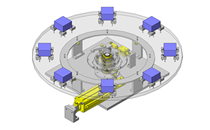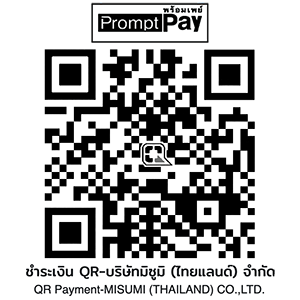(!) Since support from Microsoft will end on January 14 2020, Windows 7 user might not be able to use MISUMI website effectively. Please consider to update your system as ‘MISUMI Website system requirement’.
- Scheduled Maintenance Notice: This site will be unavailable due to scheduled maintenance from 8:00 30/6/2024 to 5:00 1/7/2024. We apologize for the inconvenience.
- แจ้งวันหยุดทำการในเดือน มิถุนายน 2567 | Notice holiday in June 2024 > คลิก
IMAO CORPORATION Knuckle Joints(Accessories Included:Not Included)
IMAO CORPORATION offers products Knuckle Joints specified by Accessories Included Not Included from Automation Components product category. There are a total of 1 items. Search and select detailed specifications of parts for your machine with free CAD downloads. IMAO CORPORATION products are available to order through MISUMI online 24 hours a day. Free shipping, no minimum order.
Configure
Specification/Dimensions
-
Mounting Method
-
 Tapped
Tapped -
 Threaded
Threaded
-
-
Thread Size M(mm)
-
Thread Pitch(mm)
-
Material
- Steel
- Stainless Steel
- Cast Iron
- Polyamide
-
Accessories Included
- Included
- Not Included
|
Type
|
|
|---|---|
Brand |
|
| CAD |
|
| Days to Ship |
|
- 1 items
- Sort By
-
You can add up to 6 items per a category to the compare list.

IMAO CORPORATION
[Features]
· Resin makes product lightweight, ideal for high speed applications.
· Can be used in liquids because of high corrosion-resistance.
· Quiet and reduces vibration.
· Fixing pins can be selected from clip type or ring type.From: ฿ 243.22 Days to Ship: 7 Day(s)
7 Day(s)
| Brand |
|---|
| Product Series |
| From |
| Days to Ship |
| Mounting Method |
| Thread Size M(mm) |
| Type |
| Thread Pitch(mm) |
| Material |
| Accessories Included |
You can add up to 6 items per a category to the compare list. | |
| Brand | IMAO CORPORATION |
| Product Series | |
| From | ฿ 243.22 |
| Days to Ship | 7 Day(s) |
| Mounting Method | Tapped |
| Thread Size M(mm) | M6 ~ M14 |
| Type | Double Notched Knuckle Joints |
| Thread Pitch(mm) | 1 ~ 2 |
| Material | Polyamide |
| Accessories Included | Not Included |
Loading...
Related Categories to Knuckle Joints
FAQ Knuckle Joints
- Question: In what applications are knuckle joints typically used?
- Answer: knuckle joints are commonly utilized in mechanisms requiring controlled rotational movement. They find applications in steering systems for automobiles and aircraft, allowing for precise direction control. In industrial machinery, such as cranes and robotic arms, knuckle joints facilitate movement in specific directions, enhancing versatility. Moreover, they play a vital role in construction equipment like excavators and loaders, ensuring efficient operation. Additionally, knuckle joints feature prominently in material handling systems and medical devices, providing flexibility and controlled articulation for various functions in engineering work.
- Question: What materials are commonly used for knuckle joints?
- Answer: Knuckle joints, vital for controlled rotational movement, utilize diverse materials based on specific needs. Steel, including carbon, alloy, and stainless variants, offers durability and corrosion resistance, fitting for industrial applications. Aluminum alloys balance strength and lightness, favored in aerospace and automotive sectors. Brass and bronze, prized for corrosion resistance and malleability, find use in architectural and heavy-duty contexts. Titanium's exceptional strength-to-weight ratio and corrosion resistance suit aerospace and high-performance machinery. Material selection hinges on factors like strength, weight, corrosion resistance, and environmental conditions, ensuring optimal functionality in diverse applications.
- Question: How do you maintain a knuckle joint?
- Answer: Maintaining a knuckle joint involves routine checks and actions to ensure its smooth operation and longevity. First, inspect the joint regularly for wear, damage, or misalignment. Clean the joint to remove dirt and debris that can cause friction and premature wear. Apply lubrication as recommended by the manufacturer to reduce friction and prevent corrosion. Tighten any loose fasteners to maintain structural integrity. Replace worn or damaged components promptly to prevent further issues. Finally, conduct operational tests to verify proper functionality. By following these steps, you can ensure the knuckle joint operates effectively and safely, extending its service life and minimizing downtime.
- Question: How do you determine the correct size of a knuckle joint for a specific application?
- Answer: Determining the correct size of a knuckle joint involves a comprehensive assessment of various factors. This includes analyzing the application's load requirements (static and dynamic), considering the necessary range of motion, evaluating environmental conditions, accommodating space limitations, and addressing mounting considerations. applications on industry standards, guidelines, and possibly consultations with experts to ensure the selected size can effectively withstand expected loads and movements while fitting seamlessly into the application's requirements.
- Question: Are there any limitations to using knuckle joints?
- Answer: Knuckle joints have limitations, including wear and fatigue over time, particularly under high loads or harsh conditions. They may introduce backlash or play, impacting precision, and improper maintenance or lubrication can hasten wear. The designer must carefully consider these factors when integrating knuckle joints into designs, ensuring optimal performance and longevity.




























How can we improve?
How can we improve?